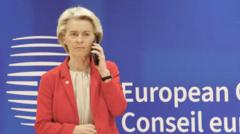The EU's General Court determined that the European Commission must disclose text messages exchanged between Ursula von der Leyen and Pfizer during vaccine negotiations, marking a critical victory for transparency advocates and igniting discussions on accountability in the EU's handling of pandemic-related contracts.
EU Court Demands Transparency: Ruling Against Commission on von der Leyen-Pfizer Messages

EU Court Demands Transparency: Ruling Against Commission on von der Leyen-Pfizer Messages
The European Court's ruling calls for the release of text messages between Ursula von der Leyen and Pfizer's CEO, echoing the demand for transparency in EU governance.
The European Commission faced a judicial setback as the EU's General Court ruled against its refusal to disclose text messages between Ursula von der Leyen and Pfizer's CEO, Albert Bourla. The court asserted that the Commission failed to provide sufficient justification for withholding these communications from an investigative journalist's request made in 2021.
This case, often referred to as "Pfizergate," centers around the significant vaccine contracts, including a lucrative agreement worth billions for additional doses over the course of the pandemic. As president of the Commission since 2019, von der Leyen's handling of this sensitive subject could have repercussions for her credibility, particularly as she was overseeing pandemic strategy during negotiations.
Transparency International hailed this ruling as a historic leap towards openness in EU dealings, advocating for a shift away from a culture resistant to public information access. The decision has crucial implications, as it challenges the operational secrecy that has been a hallmark of the Commission, especially in high-stakes negotiations involving public health.
The public scrutiny heightened in April 2021 when The New York Times reported on von der Leyen's private negotiations with Bourla. It triggered investigative journalist Alexander Fanta to file a Freedom of Information request seeking insight into the communications exchanged between January 2021 and May 2022. The Commission denied the request, claiming those documents did not exist according to their archives.
The controversy digs into the grey area of mobile text messages within the Commission's transparency regulations, with officials asserting that such communications are not routinely classified as public documents. Fanta's persistence, through a European Ombudsman inquiry, revealed the Commission's mishandling of record-keeping protocols, further complicating their stance.
During the recent court proceedings, the Commission's claims were deemed inadequate, as the court emphasized the necessity for them to demonstrate either the non-existence or deletion of the sought text messages, alongside a clear assertion regarding whether these deletions were intentional.
As the European Commission evaluates its next steps following the ruling, the larger discourse on governmental accountability and transparency in EU contract negotiations continues to gather momentum, reinforcing the necessity for clear lines of communication between public officials and private enterprises, especially in critical public health scenarios.





















